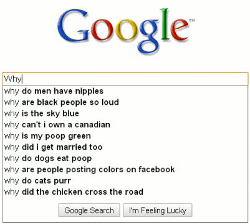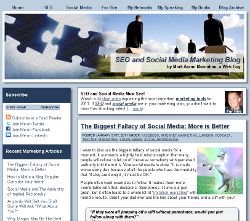
I must have heard nearly every conceivable absurd notion a person can come up with when it comes to marketing. There are a lot, and I have heard some really bad ideas about marketing practices. One silly thing I encounter a lot is when people say “It’s not about you.” A few people may really know what others mean when they say this, but I think the majority of people are just giving you hogwash.
It seems to me that this message has been mutated in so many ways that it has actually become a scare tactic against marketing, rather than good advice.
If you hear people say “It’s not about you”, you should never accept that as a reason to hide who you are, what you stand for, and what you are seeking, only to sneak it in once in a while. Tragically, I believe that is the way many people have taken this message, and it is often completely contrary to effective marketing.
Stop Letting Knuckleheads Control Your Marketing Assets
When you think of your social media marketing, and especially blogging, let’s consider some things. It is a whole lot easier to spread a message if it is useful and interesting to others, rather than just a sales pitch. That should be obvious. If you are just telling people how awesome you are without relating it to how it benefits them, your ship is sunk. Nobody wants to hear about that, and nobody wants to talk about that.
It is comparatively easy to spread a genuinely useful message far, and spread it wide. When it is done just right, it can get a lot of people talking about it, and you may even benefit from many other websites linking to it. This is also a primary factor to being listed better in search engines. It works in perfect synergy, and it grows like a downhill snowball. It all looks shiny and grand, right?
Here’s the kicker: When something is implicitly “not about you”, it comes with a big risk of people never knowing you, your brand message, or your call-to-action (what you want for them to do next). Until you show them who you are, and what your call to action includes, it is just guesswork for them, and missed opportunities for business.
If you think that being useful and interesting means you should carefully hide your call-to-action … the thing that actually provides benefit to your business … then why are you doing it at all? Who ever suggested that you should be playing Mother Teresa and Gandhi with your marketing assets? If somebody suggested that, perhaps you should give them a big hearty slap.
Finding Your Marketing Balance
There must be a good balance to your efforts, and in that balance is where much of your success is locked up like Fort Knox.
You can take the approach that those useful things you do on your blog or social networks will make up an overall better presence for your brand, and this is very true. It is a very important principle in online marketing. At the same time, you cannot expect people to go hunting through pages of information just to discover how to pay your company a profit. They won’t do it! No, they really won’t … and the numbers show the truth! This means you must create a good balance, and that balance should include letting them know what it is that keeps you in business so you will be there when they come back for more.
Sure, it is fine to give the whole world a nice pat on the bottom and a kiss on the brow, but if you are doing something valuable for others, you deserve the benefit of growing your business for it.
Where is The Voice of Your Brand?
When it comes to market research and learning who will give your brand a second glance, it is not about your company or yourself. It is about them … your market … the people who will become your loyal customers and brand advocates. With this information, it becomes about you and them, and where the two parties meet in the middle and do business.
Beyond the research, when it comes to building a brand, you would be foolish to invest in the marketing hogwash that “it’s not about you”. Yes, it is about you, but with some checks and balances. The balance comes somewhere between the value you provide, and the value you ask for, so you need to get that part right.
If the people you are reaching are the right audience, they want to hear from you, and they want to know what you’re all about … whether you represent a company or an individual. That sense of “You” is what they connect with, and what gives them the confidence in who they are considering doing business with.
I’ll explain this in real and vivid terms, and I stand behind this. First, I’ll give you a bit of background, and then I’ll explain the direct benefits to you. I hope you can apply this to your business.
I’ve been in marketing my entire adult life. I have provided marketing consulting and training to successful companies when I was as young as 15 years old. I was raised into it by some brilliant parents, and they taught me a lot. They mentored me.
I was actually raised for my job, much like the six year old girl playing piano in the video above was raised to be a concert pianist. I was fed all of the best books about marketing, success, and motivation. I was taken to conferences of all types and sizes. I was hidden behind phone lines and fax machines to work with clients who simply wouldn’t understand it if they knew their new marketing campaign was largely being constructed by a kid.
I was on a stage talking to people about marketing before I was old enough for a driver’s license. Back then, I could barely wait to be 40, so people could take me more seriously. Today, as I approach 40 a couple months away, I question whether that was my best goal. In any case, I suppose that turning 40 with 25 years of marketing experience and business ownership has its upsides.
I grew up a lot faster than I would ever wish for my children, but I had good mentoring for this career. My parent-mentors trained me to understand how to make something marketable, and how to see markets as systems. That means seeing more than just “the dots”, but rather being able to connect the dots between companies and their consumers. I don’t know why I was raised that way, but my parents had their reasons, and must have seen something in me.
Ten years after I left school at 15, I was able to retire early, as a 25 year old “know-it-all”. Some years later, I went back to work and merged two companies and grew them to the pinnacle of the wholesale Internet services industry. I have also created similar success for clients who had the fortitude and desire to grow their companies, and called me to build and manage their marketing strategies.
That’s a small portion of my career history. I am not ashamed to tell you, nor afraid that it offends you. That does not make me dis-interesting to the right people, and it does not make this all about me, either. If somebody is dis-interested in my career history and qualifications in marketing, they may be the type who will listen to the first slick-talker to tell them what they want to hear. I’m not that guy, and I have a robust brand message that confirms it. I am a guy who strongly understands that it takes willingness to make sacrifices in order to build a successful company … and my clients do, too.
Here’s How You Benefit Knowing This
I offer a lot of reliable information on this blog, the majority of which is based on things I have witnessed in my career. The benefit to you of knowing about my history, who I am, and what I’m about is that you may have more confidence in the things I write. If you have good reasons to trust my integrity, you can see that my efforts are intended to be helpful, and not based on hype.
You can learn a whole lot about my industry, and gain a lot of useful information on this blog … and I provide it for free! If you want the other 99.7 percent, and you want it implemented exceptionally well, I welcome you to contact me to see if we’re a good match. That’s what I’m paid for, and I’m not a bit apprehensive to ask for your business.
Are you ready? If so, click here!
Oh, but there is another point I want to make about one of those early lessons I learned in marketing … just to drive the point home.
The Lessons of Two Ears and One Mouth
Early in my marketing career, I received constant reminders of why I was born with two ears but only one mouth. That is a really tough lesson for most kids to master … and some never do. They explained that it was because I should be listening twice as much as I talk. Of course, a critical part of marketing is to listen to the customers. That’s how you come to understand them, and their desires. It is critical, and it is what market research is for.
I think this is the part where the notion that “it’s not about you” totally confounds a lot of people.
Another lesson I learned that was equally valuable is that when people are considering a purchase, they also appreciate a story of how well the product or service worked for others … or how it could work for them. In order for them to become a customer, they must envision having whatever it is you are offering for sale, and they must envision it with a favorable outcome.
This means, you must be more than just a listener. You also need to know how to tell a story. Sometimes it is a story of a customer, your product, your brand, or your experience, but that’s what people connect with and understand. If you have a story from your experience in business, tell it. Yes, it is about you, and that is a good thing! That is a whole lot better than letting people guess, and it is a lot more genuine than just telling somebody how great your product or service is. That piece of “you” is what becomes valuable … so in this sense, I’d say yes … it is about you!
A question that sticks with me is this: “Would you rather be an interested introvert or an interesting extrovert?” I think we all want to be a little of both, but if you put this in terms of a customer and a seller, I would have to say that I want them to be interested and I want to be interesting. That doesn’t mean turning off the listening, but it does mean you’ve got to do some talking.
People don’t want to hear your hyperbole, but they do want to hear what makes you who you are. If you hide that because somebody told you “it’s not about you”, then you are covering up your best asset. When it comes down to actually doing business, those things about you are what makes up a large portion of their decision.
Just as there are more followers than there are leaders, I believe there are a lot more introverts in the world than there are extroverts. This may be partially because in order to be an extrovert, you put yourself out there on a limb. You are taking a risk to be the one doing the talking. Don’t worry though, because even if you try really hard, you will never make everybody like you … and it is counterproductive to even try.
I say go for it … talk about yourself enough so we can know who you are and what you stand for. If you don’t, all that your would-be customers have to base their buying decisions on is facts and figures. Unless you are the best and the cheapest, all at once, somebody else can nearly always beat you out on at least one of those measures.
That’s my piece. It’s your turn, and it’s all about you, now. Go ahead and add your comments to tell me I’m wrong.
Photo Credit:
Pig by dullhunk via Flickr
Podcast: Play in new window | Download












